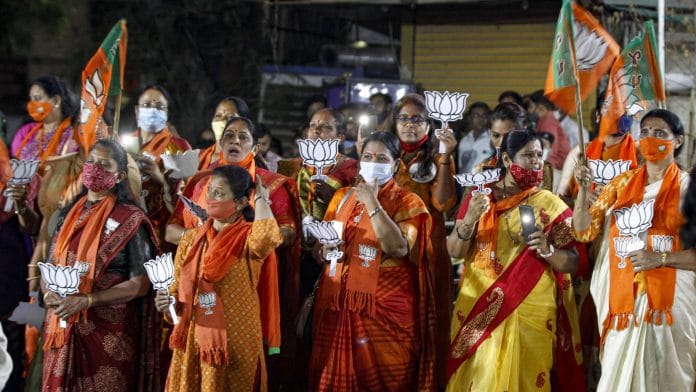New Delhi: The BJP Tuesday swept elections to six municipal corporations in Gujarat by winning 483 out of 576 seats, while Congress won 44, and a new entrant in the state, the Aam Aadmi Party (AAP), won 19. Meanwhile, All India Majlis-e-Ittehadul Muslimeen (AIMIM) won seven of the 21 seats it contested in the Ahmedabad Municipal Corporation polls.
If AAP has gained a hold on the Patel vote in Surat, which was a Congress vote bank in the 2017 assembly elections, and if AIMIM has a hold on the Muslim vote in Ahmedabad, the Congress party’s 20 per cent confirmed vote bank is now “going abegging”, said ThePrint’s Editor-in-Chief Shekhar Gupta in episode 690 of ‘Cut the Clutter’.
Only six municipal corporations have gone for elections in Gujarat — Ahmedabad, Surat, Vadodara, Rajkot, Bhavnagar and Jamnagar, while polls to 31 district panchayats and 231 taluka panchayats will take place on 28 September.
Gupta explained that municipal elections are often a “bellwether” for what might happen in assembly elections to come. He added that since Gujarat is quite ‘rurban’, what happens in cities reflects in villages and vice versa.
Congress had put up a fight in 2017 assembly elections
The results of the municipal polls have been “predictable” given that Gujarat is a “Modi-Shah state”. Gupta added: “In the last two elections, they [BJP] won all the Lok Sabha seats there. They’ve been winning the state assembly there since the mid-90s.”
The closest Congress has come to reversing the “Narendra Modi juggernaut” in Gujarat was in the 2017 assembly elections when it rallied an alliance consisting of diverse parties from Thakurs to Dalits. At the time, the BJP got 99 seats which was 16 less than what it had earlier and only seven more than the majority mark, while Congress secured 77, which was 16 more than what they had earlier.
If the Congress had been successful, it would have broken Modi’s momentum ahead of the general elections in 2019, added Gupta. He explained that that is why Modi, who “doesn’t take his politics lightly”, addressed 38 rallies in the state ahead of the 2017 assembly polls.
“There was a trend in Gujarat for the past three [assembly] elections where BJP was ahead of the Congress, but Congress was narrowing the gap,” observed Gupta. The gap was 9.47 per cent in 2007, 9 per cent in 2012 and 7.7 per cent in 2017, showing that Congress was going up both in vote share and seats, he added.
He explained that the last time Congress was in power in the state it was widely believed that Congress leader Madhav Singh Solanki was able to become chief minister of Gujarat in 1980s due to the ‘KHAM’ votebank, i.e. Kshatriyas, Harijans, Adivasis and Muslims.
“It’s only later when the RSS and the BJP were able to cut into the Adivasi vote bank that things began to change,” explained Gupta.
Also read: Ahead of MCD bypolls, Kejriwal says BJP-ruled Delhi civic bodies in mess, AAP only alternative
‘Rahul Gandhi failed to build on his success of 2017’
In the recent municipal elections, Congress has suffered major losses and has been wiped out majorly in a ratio of 9:1 seats in comparison to BJP, said Gupta.
In Ahmedabad, it got 25 seats while BJP got 159; in Rajkot, it got 4 seats while BJP got 68; in Jamnagar, it got 11 seats while BJP got 50; in Bhavnagar, it got 8 seats while BJP got 44; in Vadodara, it got 7 seats while BJP got 69 and in Surat, it got 6 seats while BJP got 93.
“Rahul Gandhi failed to build on his success of 2017,” remarked Gupta, adding that the Modi-Shah duo may be relieved ahead of the assembly elections in the state next year.
Dissecting Congress’ poor performance, Gupta said that it was partly because the party has been ridden with defections and the “national leadership is not able to attract these votes”. There was also a consequence to propping up Patidar leader Hardik Patel in Gujarat, he said.
Looking at the results in Surat, Gupta pointed out that while the BJP won 93 seats, AAP won 27 seats and Congress was unable to secure a single seat. He explained that most of AAP’s support came from those who were part of Patidar Anamat Andolan Samiti (PAAS), a movement led by Hardik Patel. However, when Patel joined the Congress, the community switched their support to AAP.
Looking at the results in Ahmedabad, Gupta pointed out that BJP got 159 seats, Congress got 25 and AIMIM bagged seven.
This indicates a loss of the Muslim vote for Congress. The 2014 and 2019 general elections showed that Congress has a solid 20 per cent of the vote in its pocket but that may not hold true, if the party does not have leaders in a state, said Gupta.
Citing various examples, he said that in West Bengal, Mamata Banerjee had taken away that vote from Congress, in Andhra Pradesh it was YSR Congress Party, in Telangana it was Telangana Rashtra Samithi and though Congress is an ally in Maharashtra, the Nationalist Congress Party is increasingly eating up Congress’ share too.
Gupta said the civic polls spell “deep trouble” for Congress, given AAP and AIMIM’s performances. It also jeopardises the 20 per cent base vote bank it seems to have at the national level, based on its performance in the 2019 and 2014 general elections.
Also read: Not Modi’s rise, not Rahul’s fall. Arvind Kejriwal is this decade’s biggest political story
Watch full episode here:







Fact check, AIMIM won 4 in Ahmedabad jamnagar, and AAP won 27 in surat